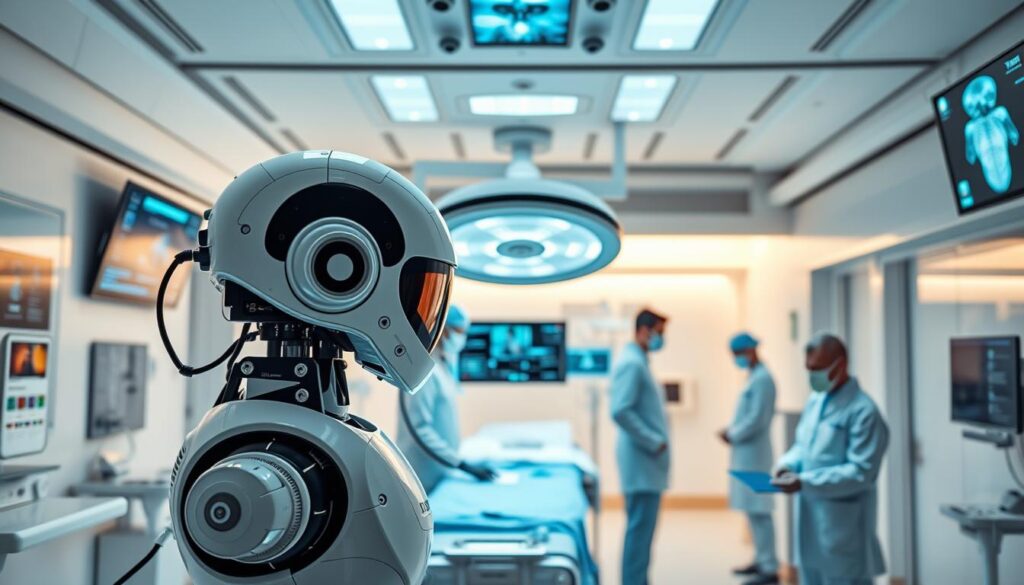The healthcare world is changing fast, thanks to automation. It’s making patient care better in many ways. From using artificial intelligence (AI) to improving with healthcare robotics, the industry is moving into a new tech era. This change is making a big difference in how we care for patients.
This article looks at how automation is changing healthcare. We’ll see how AI is bringing new ideas to medical care. These changes are making healthcare better for everyone.
Key Takeaways
- Automation is redefining the future of patient care, enhancing efficiency, accuracy, and patient outcomes.
- AI-powered technologies are revolutionizing clinical decision-making and streamlining healthcare workflows.
- Robotic systems are improving surgical precision and supporting clinical staff in delivering exceptional care.
- Digital healthcare transformation is modernizing patient record management and optimizing operational processes.
- Automated healthcare management systems are enabling data-driven decision-making and predictive analytics.
The Rise of Automation in Healthcare
The healthcare industry is moving towards automation. This change aims to make things more efficient, cut down on mistakes, and improve patient care. The push towards Healthcare Workflow Optimization and Medical Process Automation comes from several important reasons.
Driving Forces Behind Healthcare Automation
One big reason for healthcare automation is the need to make things more efficient and cost-effective. Automated Healthcare Management Systems can help by cutting down on administrative work, better using resources, and boosting productivity.
There’s also a strong push for better patient safety and care results. Automated systems can handle routine tasks and lower the chance of mistakes. This means patients get more consistent and reliable care.
Benefits of Automating Healthcare Processes
Automating healthcare brings many benefits. For one, Healthcare Workflow Optimization can save a lot of money. It reduces the time and effort needed for tasks like data entry, managing supplies, and scheduling patients.
Automation also makes patient care better by making it more accurate, timely, and consistent. Medical Process Automation lets doctors and nurses focus on more complex tasks. This leads to better use of resources and better patient results.
“Automation in healthcare is not just about enhancing efficiency; it’s about transforming the way we deliver care and improving the lives of patients.”
As healthcare keeps changing, Automated Healthcare Management Systems will be key. They will help shape the future of patient care, lead to better results, and make the healthcare system more effective.
AI in Healthcare: Revolutionizing Patient Care
The healthcare industry is on the brink of a big change, thanks to artificial intelligence (AI). AI is changing how we care for patients. It helps doctors make better decisions and improves disease diagnosis.
Clinical Decision Support Systems are a big part of this change. These systems use AI to help doctors make informed decisions. They look at patient data and medical research to suggest the best treatments.
AI is also great at finding diseases early. It looks at medical images and patient records to spot health issues. This means doctors can treat problems sooner, helping patients get better faster.
AI does more than just help doctors. It also helps hospitals run better. AI predicts what patients will need, making care more efficient. This means better care for everyone.
“AI is not just a tool, but a transformative force that is reshaping the healthcare landscape, empowering clinicians and improving patient lives.”
AI is making healthcare better for patients. It’s making care more personal and efficient. AI is changing the way we care for patients, making it smarter and more focused on the patient.
| Key Benefits of AI in Healthcare | Potential Challenges |
|---|---|
|
|
Healthcare Robotics: Precision and Efficiency
The healthcare industry is always looking for ways to improve patient care. Healthcare robotics has become a key player in this effort. These technologies are changing medical practices, from surgery to daily clinic work.
Surgical Robots: Enhancing Accuracy and Outcomes
Surgical robots are making a big difference in the operating room. They offer unmatched precision and control. These machines use advanced algorithms and sensors to help surgeons do complex tasks better.
By reducing human mistakes, surgical robots lead to better patient results. Patients recover faster and have fewer complications after surgery.
Robotic Assistants: Supporting Clinical Workflows
Robotic assistants are now a big part of healthcare. They make many tasks easier and more efficient. They help with things like inventory and moving patients.
These robots save time for doctors and nurses. They can focus on giving better care. Healthcare robotics makes work smoother, cuts down on mistakes, and boosts medical facility productivity.
| Feature | Surgical Robots | Robotic Assistants |
|---|---|---|
| Precision | Extremely high | High |
| Task Automation | Complex surgical procedures | Repetitive administrative tasks |
| Impact on Outcomes | Improved patient recovery and reduced complications | Increased efficiency and workflow optimization |
| Key Benefits | Enhanced accuracy, control, and consistency | Streamlined processes and freed-up clinician time |
The use of healthcare robotics is changing medicine. It’s making care more precise and efficient. As these technologies get better, so will patient care and outcomes.
Digital Healthcare Transformation: Streamlining Operations
The healthcare world is changing fast, thanks to new tech like electronic health records (EHRs) and data management systems. These tools are making healthcare better by making it more efficient and patient-focused.
Electronic Health Records and Data Management
Electronic health records have changed healthcare for the better. They make patient data easy to access and share. This helps doctors make better decisions and work together better. With smart data management, healthcare teams can use data analytics to improve care and operations.
| Benefits of EHRs and Data Management | Impact on Healthcare Operations |
|---|---|
|
|
As healthcare moves forward, using electronic health records and data management will be key. They help make healthcare better, more efficient, and focused on the patient.

Medical Process Automation: Optimizing Workflows
In the fast-changing healthcare world, medical process automation is a big change. It changes how healthcare groups work. By automating medical tasks, healthcare providers can make their work better, more efficient, and care for patients more effectively.
One big plus of medical process automation is fewer mistakes. Tasks like data entry, scheduling, and managing meds often have errors. Automating these tasks cuts down on mistakes and lets healthcare pros spend more time on patient care.
Also, medical process automation helps use resources better. Automated systems manage patient flow, schedule, and inventory well. This means healthcare groups can use their staff and resources better.
| Key Benefits of Medical Process Automation | Impact on Healthcare Workflows |
|---|---|
|
|
By using medical process automation, healthcare groups can make their work better and improve patient experience. Patients get faster service, shorter waits, and a smoother healthcare journey.
“Automating medical processes is a strategic imperative for healthcare providers to stay competitive and deliver exceptional patient care in the digital age.”
As healthcare keeps changing, using medical process automation and healthcare workflow optimization will be key. It helps improve patient results, work better, and stay ahead.
Automation in Healthcare: The Future of Patient Care
The healthcare industry is changing fast, thanks to automation. New technologies like artificial intelligence (AI), robotics, and digital healthcare platforms are changing how care is given. They make services better, more efficient, and tailored to each patient.
At the core of this change is the future of patient care. These technologies work together to improve the healthcare experience. They help with tasks and make decisions better, affecting many areas.
AI in Healthcare is a big deal. It can look through lots of medical data, find patterns, and give doctors insights. This helps doctors give better care, leading to better health for patients.
Also, Healthcare Robotics is changing how some procedures are done. Surgical robots make operations more precise. Robotic assistants help with tasks, making care more efficient.
The Digital Healthcare Transformation is also making things better. It makes managing health records easy and helps use resources well. This lets healthcare focus more on patients, not just paperwork.
Looking ahead, automation will keep changing healthcare. By using AI, robotics, and digital tech, care will become more personal and effective. This will help people and communities stay healthy.

Healthcare Workflow Optimization: Enhancing Efficiency
In the fast-changing world of healthcare, making workflows better is key. It helps improve efficiency and care for patients. By using automation, healthcare places can make tasks easier, move patients faster, and use resources better. This makes the healthcare experience better for everyone.
Automating Administrative Tasks
The healthcare world is full of complex tasks like scheduling and billing. Automating these tasks helps staff do more important work. With Healthcare Workflow Optimization tools, tasks like these can be done faster and with fewer mistakes.
Improving Patient Flow and Resource Allocation
Getting patients through the system quickly is crucial. Improving Patient Flow and Resource Allocation with automation helps a lot. It makes sure resources are used well, cuts down wait times, and makes patients happier.
Using Healthcare Workflow Optimization can change healthcare for the better. It saves money, makes patients happier, and helps people get better faster.
“Automation in healthcare is not about replacing human expertise, but rather enhancing it to create a more efficient, patient-centric system.”
Clinical Decision Support Systems: Augmenting Clinical Expertise
In healthcare, Clinical Decision Support Systems (CDSS) play a key role. These AI tools use predictive analytics in healthcare to help doctors make better decisions. This leads to better care for patients.
Evidence-Based Decision-Making
CDSS use data to guide doctors in making the right choices. They look at lots of medical data to give advice and alerts. This helps doctors avoid mistakes and give care that fits each patient’s needs.
CDSS also learn and grow over time. They keep up with new medical research and findings. This means doctors always have the latest and best information to make decisions.

